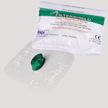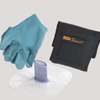|
Sudden
Cardiac Arrest
In the United States, more than 350,000 people die annually from
sudden cardiac arrest (SCA) before reaching a hospital. This
death toll is equivalent to more than 1,000 people each day, or
the population of a mid-size city, like Minneapolis, Corpus
Christi, Honolulu, Stamford or Fresno. In fact, SCA is far
more common than any other cause of death
The most common cause of SCA is ventricular fibrillation -- a
lethal arrhythmia characterized by rapid, chaotic contractions of
the heart. While in ventricular fibrillation, the heart is unable
to pump life-sustaining oxygenated blood to vital parts of the
body, particularly the brain. While there are many contributing
factors, SCA can strike people at any time, whether or not they
have a diagnosed heart condition.
Death from SCA is sudden and unexpected, occurring instantly or
shortly after the onset of symptoms.
Why is Early Defibrillation Important?
In many cases, SCA can be reversed with early defibrillation --
the use of a defibrillator to shock the heart back into normal
rhythm by means of an electric current. To be most
effective, defibrillation must occur as soon as possible after the
onset of SCA. Published studies have proven that early
defibrillation, within the first few minutes of SCA, can save up
to 30 percent of victims.
According
to the American Heart Association (AHA), each minute of delay in
delivering a defibrillation shock to a cardiac arrest victim
reduces the chances of survival by 10 percent.
The
average response time nationally for emergency medical personnel
equipped with defibrillators is 10 minutes, making access to
defibrillators on-site or in first-responder vehicles (police
cars, fire trucks, etc.) extremely important.
Cardiopulmonary
resuscitation (CPR) works to temporarily circulate blood to vital
organs. However, CPR alone rarely restores a patient's heart
to a healthy rhythm.
The
AHA states that the definitive survival treatment for an SCA
victim is a defibrillation
shock.
ReadyCare is an Authorized Provider for the American Red Cross.
|
NEED AED'S ?
Let us help you
(925) 937-5288 |
|
IF YOU ARE INTERESTED IN SCHEDULING A CPR OR AED CLASS, OR IF YOU NEED HELP TO FIND ONE IN YOUR AREA, CLICK
HERE. |
|









